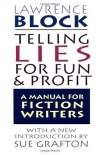Manual For Fiction Writers by Block, Lawrence (classic books to read .TXT) 📗

Book online «Manual For Fiction Writers by Block, Lawrence (classic books to read .TXT) 📗». Author Block, Lawrence
By concentrating on details and not attempting to describe photographically, you greatly increase your chances of writing something the reader will happen to remember. By relating those aspects of the character worth mentioning, and by omitting pedestrian physical description, you make an impression upon the reader. I won't quickly forget that waitress touching her hair to reassure herself it was still there.
There's a thin line between this sort of impressionism and out-and-out caricature. The art of a caricaturist consists of ignoring the ordinary and exaggerating the remarkable. Sometimes, to convey a minor character rapidly and indelibly, caricature is tempting.
Ian Fleming did this all the time, and not without knowing what he was about. James Bond's supporting players were all caricatures, deliberately twisted to comic-book grotesquery. They had improbable names and unlikely physical attributes and mannerisms. This made the Bond books vivid and memorable and had a great deal to do with their success. It also made them utterly unrealistic and ruined them for those readers for whom the illusion of reality is a requirement for the enjoyment of fiction.
If you are trying to write realistic fiction and you people it extensively with overdrawn characters, you're working against yourself. You can occasionally get away with filling books and stories with grotesques, but unless your name's Carson McCullers it gets tricky.
A less obvious form of caricature consists of giving an otherwise ordinary character a trait or attribute or mannerism on which the reader may focus his attention. The waitress with her beehive hairdo is an example. If she figured more prominently in the book than she does, and if we had that hair-patting reported constantly, it could get to be a bit much. As a quick snapshot it's fine.
In Time to Murder and Create, I've got a character in the first chapter named Spinner Jablon. He got his sobriquet because of his habit of spinning a silver dollar on the table as he talks. Well, by the end of the chapter old Spinner's dead as a lox, and it's a damn good thing, because I couldn't have endured his spinning his way through the next sixty thousand words. As it stands, I'm afraid Spinner verges on caricature.
Sometimes the work you do on casting pays off in the plotting area. As I write this column I'm at work on a novel about a burglar who's recruited by a friend to filch something from the apartment of the friend's ex-wife. (While he's doing this the woman gets killed, the friend gets jugged for the killing, and the heroic burglar comes to his aid and investigates the murder.)
I tried to figure out who this friend should be. I decided he could be a poker buddy of the burglar's, but I wanted them to have some other connection as well. I decided that the friend ought to be the burglar's dentist, and I imagined a scene where Bernie the Burglar is in the chair getting a tooth drilled, all those things hanging out of his mouth and all, and the dentist is laying this whole riff on him.
And I decided the dentist wanted the something-or-other filched because he wants to remarry, and the girl he wants to marry is his dental hygienist, who'd be introduced cleaning Bernie's teeth, and later in the book the two of them could get involved, and the murder weapon, hell, the murder weapon could be one of those fiendish dental implements that all dentists have a whole arsenal of, and the actual murderer could be?
Sorry. You'll have to read The Burglar in the Closet to find that out. But all that plot business evolved from a casting decision.
On the basis of that, I suppose I could say something about there being more than one use for the old casting couch. Or I could work up some sort of wordplay on casting pearls before swine, or bread upon the waters. Or aspersions.
But I wouldn't do anything like that. Trust me.
CHAPTER 44
Name Calling
HOW CAN you pick names for your characters? If there are tricks to every trade, what are the tricks in this one?
Let's grant, first of all, that the success or failure of a piece of fiction rarely hinges upon the names of the characters. I've never heard of an editor buying or rejecting a story on this basis. Not consciously, at any rate; on another level, character names can certainly influence how he feels about what you've written, and thus can weigh in the eventual decision to accept or reject.
What names to use is a decision you have to make every time you sit down to write a piece of fiction. And your decisions in this regard frequently have to be made spontaneously?no matter how thoroughly I may work things out in advance, any session at the typewriter will see the emergence of some unanticipated minor character, some bit player or spear carrier who needs to be named. One might as well learn how to do this sort of thing effectively.
Here then, in no particular order, are some observations on the name game:
1. AVOID CONFUSION. This might be too obvious to mention but for the fact that even published writers slip up from time





Comments (0)